Part 6: Caught in a Vortex — The Vietnam Protests
Still feeling like a stranger in a strange land, I stopped moping long enough to check out the District of Columbia’s main attractions: the White House, the Capitol, and the Washington Monument.
The latter erection, a modern day wonder of the world, had a mighty pull. I joined a peculiarly large number of tourists walking purposefully toward the imposing 55-story phallus.
Upon closer observation, I ascertained that these tourists weren’t hayseeds from the Midwest or typical Nikon-toting Japanese.
They were in fact a lot like me: longhaired, bellbottomed, and quizzical about our involvement in the Vietnam War. Hostilities in Southeast Asia had escalated to the point that the Selective Service was now drafting able-bodied males to send against an “enemy” which had not even struck our shores with as much as a peashooter, much less staged a Pearl Harbor-type surprise attack. .
One consequence of waging war on foreign shores based on false-flag operations like The Gulf of Tonkin Incident is that hundreds of thousands of draftees who flew to Vietnam in troop transports returned home in wooden boxes. they now rested in peace at Arlington National Cemetery across the Potomac.
I surmised that this gathering was taking place to address that very concern.
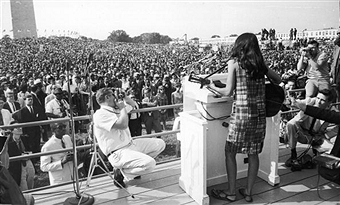 Folk music could be heard through distant loudspeakers.
Folk music could be heard through distant loudspeakers.
Drawing within earshot, I recognized the lilting soprano of Joan Baez. The popular songbird was Bob Dylan’s “main squeeze.”
Geez, there must have been 50,000 people gathered there that day.
Many of them were students, foreshadowing the ten-times-larger crowds that would assemble on the same grounds later that surrealistic semester.
The folksinger left to enthusiastic applause.
She was immediately followed at the mic by comedian Dick Gregory. He’d taken on a new role as an inspirational speaker at a succession of impromptu war protests that had taken place from DC to Berkeley.
And now Gregory was working the crowd, drawing on his Southern Baptist upbringing, preaching his gospel in a stirring speech heavy on call-and-response:
“Anyone here want a free ticket to Vietnam?”
“Hell no, we won’t go!”
“Anyone here gto any quarrel with them Vietcong?”
“Hell, no, we won’t go!”
“Anyone here wanna die in Vietnam?” ”
“Hell no, we won’t go!”
I’d never seen a white crowd react that strongly to a black public speaker. Gregory’s antiwar message connected in a big way.
The call to get out there and congregate in massive rallies had been spreading organically throughout the “counterculture” from print ads and word-of-mouth — like the be-there-or-be-square messages for the Woodstock festival which resulted in attendance figures topping 500,000 — ten times the predicted 50,000.
In 1969, it’s as if we were all ants or bees who’d somehow received collective messages to go forth and worship rock music and protest a war; these directives superceded normal activities like building anthills and hovering for honey. Humans were flocking and swarming, responding to a call of the wild.
Perhaps in 2013 the same cell towers some scientists hold responsible for bees’ Colony Collapse Disorder Syndrome also interfere with the collective ability to receive vital messages calling for massive demonstrations in conspicuous locales like the Capital Mall.
From Warhol to Shakespeare
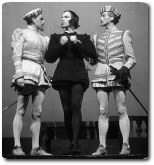 Back in academia, I somehow convinced a sympathetic professor to let me audit the same acting class I’d been shut out of. I even managed to wrangle a role as Rosencrantz or Guildenstern, I forget which, in the popular-at-the-time homage to Shakespeare’s Hamlet, Rosencrantz and Guildenstern Are Dead. A production would be held toward the semester’s end.
Back in academia, I somehow convinced a sympathetic professor to let me audit the same acting class I’d been shut out of. I even managed to wrangle a role as Rosencrantz or Guildenstern, I forget which, in the popular-at-the-time homage to Shakespeare’s Hamlet, Rosencrantz and Guildenstern Are Dead. A production would be held toward the semester’s end.
Acting was the only class I looked forward to because it was held in the PM and it attracted lots of actress babes I wouldn’t have met otherwise. For those pragmatic reasons, my attendance was perfect.
I was not exhibiting similar enthusiasm for my other classes. Signs that my soon-to-become psychedelic semester might not be marked by academic achievement had already started appearing.
- I wasn’t responding well to the curriculum of third-choice classes I would up with at AU. While the thought crossed my mind that it might not be a bad idea to alter that attitude fast if I had any prayer of staying on the Ivy League track, an array of events, circumstances, and realities was conspiring against it. For example …
- … everywhere I looked I saw overwhelming evidence that a new world order marked by peace, love, and understanding was emerging. The old world order — birth/school/work/death — was falling by the wayside. Universities, like AU, were bastions of the old world order. The new world order was Summer Film School, Woodstock, and massive antiwar demonstrations with great music.
- It seemed as if every person I met had a better stash than the last one. Accordingly, every evening ended later than the last one. What happened was that potentrepreneurs had realized that there was a ton of money to be made from importing more potent varieties of grass and hash than the commercial Mexican and Colombian weed that everyone was used to. Enterprising individuals began importing hashish from far-off lands like Morocco and Lebanon along with exotic strains of grass like Thai sticks and Panama Red. DC, where half the town had diplomatic immunity, was a preferred port of entry.
With all that going on, September faded into October. The likelihood of dragging myself to 11 o’clock classes was now iffy. 9 AM History of Modern Europe lectures were completely out of the question. That “F” for effortless I received on the History of Modern Europe midterm was going to come back and haunt me.
Maryland as a “southern state”
Despite my erratic performance in academia, I was actually getting along well with others in the WTTG newsroom. After being there a month, I hadn’t messed up a score yet. Neither had I spilled coffee on Connie Chung’s blue blazer or hit on her — Maury Povich, married at the time, had already caught her fancy. The fact that I didn’t have to show up at Metromedia until noon gave me a fighting chance to succeed at business without really trying.
I’ve mentioned that a hippy Americanus like myself fit right in with the international news team which came from all walks of life.
However, a floor below the newsroom was a production room staffed exclusively by technicians belonging to the genus rednecks Marylandus. I had to go down there and hand off the slides containing the scores I’d carefully prepared to a klatch of Ku Klux Klansmen. These accomplished bigots beamed “Lafayette 31, Lehigh 27” out to millions of television “sets” (I never quite grasped how one TV constituted a set).
The anger and resentment these veterans expressed over having a longhaired war protestor in their midst went way beyond good-natured ribbing. I was previously uninformed that hardcore rednecks existed much less flourished in the state of Maryland. It was only a couple of hours away from New York by car. If I ever thought about it, it was as a northern state with a lot of crabs, not a southern state with a bunch of rednecks.
Those redneck technicians were pissed because their beloved country right-or-wrong was changing quickly, changing quickly because of hippies, longhaired hippies like me, longhaired hippy peaceniks like me who dared protest US war planes bombing the hell out of Southeast Asia leaving some 600,000 ground troops to try and fail at cleaning up the mess. An actual longhaired hippy “peacenik” invading the production room clutching a bunch of slides inspired some sizzling eptithets I must say made whatever taunting I’d received to that point of my life seem like amateur hour.
I dreaded going down there. Let’s just say that if there was a nearby tree and a rope available they would have been put to good use. It was like interacting with the same good ‘ole boys who took a shotgun to Peter Fonda and Dennis Hopper in Easy Rider — another smash counterculture movie that was taking the world by storm that semester. I’d already seen it twice, relating to it completely.
Encountering extra-strength antagonism like that was really too bad because the Multimedia soundstage was on the same floor as the production room.
WTTG produced a weekly music show featuring soul acts like Sam and Dave, Wilson Pickett, and The Ike and Tina Turner Revue. I loved hanging around there for as long as I could get away with, marveling as these ultra-tight units carved out the “Stax Sound.”
After tasting a smorgasbord’s worth of bitterness dished out by the redneck production team, flirting with three pink-miniskirt clad Ikettes was indescribably delicious.
As it developed, the tension in the production room reflected the tension that was about to hit the streets.
The warmup march
On October 15, in the year of our lord 1969, about two million people across the country took part in what the media dubbed “Peace Day” [official name: “The Moratorium for Vietnam”]. The largest rally was held, where else, in DC. 250,000 demonstrators flooded the streets demanding an end to the war.
Other folks who supported the war like my buds in the production room also made their feelings known by driving around with their headlights on.
Peace Day was held for whatever reason on a Wednesday, meaning it wouldn’t interfere with my weekend job and I could “make the scene.” In t hose days, people cared enough to drop whatever they were doing midweek to join the likes of Pete Seeger and singalong with “Give Peace a Chance.”
I don’t even want to think about how few folks would turn out for something like Peace Day today. Let’s not go there — I promised to keep the editorializing to a minimum … but there is a reason I’m writing this.
An afternoon singalong morphed into a twilight “candlelight vigil.” I didn’t attend a whole lot of candlelight vigils during my formative years in the burbs. I might have known what a vigilante was from watching one too many Westerns like Shane, but a “vigil” was new and different to me and probably everyone else, too. Vigils afforded fabulous opportunities to pick up chicks wearing peace symbol necklaces, therefore my attitude was the more vigils the merrier.
Back when they were taking place, happenings like Peace Days, Vietnam Moratoriums, and candlelight vigils seemed like a normal part of the college experience, not all that different from studying at the library, working on term papers, or nodding out at lectures. I wish I could tell you that I knew I was living history but the truth is I was way too dumb to realize it.
Carole redux
After two months of continual longing, my days of pining away for Carole were about to end. I’d arranged to meet her sultry self in NY in early November. To get to there, I took the long-defunct Eastern Airlines shuttle — which cost something like $18 for travel between DC and NY, first-come first-served no reservation required — for our scheduled rendezvous on the corner of 8th Street and 2nd Avenue in The East Village.
“You’ve lost your tan,” were the first words out of her mouth. That was my cue that something else had been lost, too. Sure enough Carole had met some intellectual dude her own age who worked in the same bookstore, a small neighborhood shop like the one about-to-be-extinct Meg Ryan ran in You’ve Got Mail. They were now “an item.”
Like the unspoken pact between Benjamin and Mrs. Robinson, my arrangement with Carole came with an expiration date. I moped about it for a while before I returned to DC just in time for …
The big one
The Second Vietnam Moratorium began Friday, Nov. 14 1969, with the aptly-named the “March Against Death.”
Marchers gathered outside the gates of Arlington National Cemetery in frigid conditions. Each of what was later announced as the 46,000 marchers carried a sign with the name of a U.S. soldier killed in the war or a Vietnamese village destroyed by American troops. They walked single-file on sidewalks, stopped for traffic lights and obeyed all other traffic regulations.
Around 6 PM, the marchers began making their way toward The White House, where Dick Nixon was watching their every move. The first marchers arrived at 1600 Pennsylvania Avenue around 7 PM. When they reached the White House, they called out the name on their placards. Then the solemn vigil continued down Pennsylvania Avenue to the Capitol, where marchers deposited their placards in one of 40 black wooden coffins.
It was living theater that really hit home.
Forty-four years later, pro-pot activists have conjured up nothing remotely that passionate, inventive, or symbolic in what should be a rebellion to overthrow prohibition that’s been dummied down to a state-by-state bend-over instead.
We’ve become a nation of virtual zombies too uninspired and unimaginative to do what needs to be done to gain a full complement of herbal rights. Forgive me if I’m unimpressed.
In 1969, In the United States of American, downtrodden groups banded together They embraced big challenges and met them head on. Are there 46,000 herbal rights activists willing to do what those marchers against death did today?
I’m not sure I want to know the answer.
Whoops, I said I’d stifle my tendency to editorialize too much. That slipped out.
Anyhow, based on what I’ve written so far, you’d consider it a foregone conclusion that I was one of the 46,000 marchers, right?
But I wasn’t.
There was a good reason I didn’t march against death. Yet my world was destined to collide with the Second Vietnam Moratorium anyway.
I love the smell of tear gas in the evening
I didn’t march against death since I was slated to play a singer-songwriter gig at Saint Paul’s Episcopal Church near Dupont Circle. Those concerts were big with the acoustic crowd at a time folk music was the alpha dog like hip hop is today.
Meredith, who I’d hooked up with every few weeks that semester without taking her seriously, tagged along.
I’d played Saint Paul’s several times already, doing well enough to finally earn a featured spot. That night I was determined to justify the promoters’ faith so they’d keep booking me.
Things got off to an encouraging start as I finger-picked a few originals and some cover tunes for the packed, appreciative house. The sound of applause reverberating through the sanctuary boosted my confidence. As the set progressed, I was really getting into it, so much so that I barely noticed the hubbub coming from the streets outside the church. There was definitely some sort of disturbance going on outside. On top of that, a bluish haze, presumably smoke, hung in the rafters. More of it kept pouring in.
Still hamming it up, I was playing and singing my heart out when the commotion outside became impossible to ignore.
Suddenly, there were people, highly distressed people, running into the sanctuary.
Intent on driving to the finish, I kept performing — even as the scene became more surrealistic by the second. Medics bearing bodies writhing on stretchers set them them down and went to work. No matter. I’d heard Ethel Merman belt out “There’s No Business Like Show Business” on The Ed Sullivan Show too many times to stop now.
The show went on even as everyone in the building put two and two together and realized that haze wasn’t smoke but tear gas, a toxic substance that I’d previously managed to avoid in my continuing adventures as an antiwar protester.
I finished the last notes of the Rev. Robert Wilkins’ “Prodigal Son” and accepted a few compliments from the few remaining audience members who were still into the music despite the phantasmagoric direction the evening had taken. I grabbed my guitar and Meredith in that order and ventured out into the night.
The street scene was even more chaotic that I could ever imagine. DuPont circle was now a battleground. I asked a few freaks what had happened.
“We’re gonna burn down the North Vietnamese embassy!” came the reply.
Dozens of mounted policeman and an alarming number of national guardsmen bearing shields and night sticks had other ideas.
I was uncertain how incinerating a “commie” embassy qualified as an effective demonstration of protest against the US’ involvement in Southeast Asia. What I knew with absolute certainty was that cannisters of tear gas were exploding all around us. Tear gas is a brutally effective deterrent. Rubbing our eyes like crazy, we scrambled to find any bus stop where a Metro bus could ferry us far from harm’s way.
Here’s how old guard media described the attempt to destroy the (there was some doubt whether the target was the North or South) Vietnamese embassy:
What happened was that “a group of extremists — an ad hoc collection of “Crazies, Yippies, Mad Dogs, Weathermen and freelance fanatics numbering more than 1,000 banded together as the “Revolutionary Contingent for the Vietnamese People” broke off from the main march (against death) —The Washington Post .
“They tried to march on the South Vietnamese Embassy chanting, “Two, four, six, eight / Organize and smash the state!” When “D.C. police blocked their path, they were pelted with bottles and rocks.” —Time
That little rumble in DuPont Circle was probably the lowlight of the entire peace movement cause it violated the spirit of “nonviolent civil disobedience.”
I’d like to tell you that I couldn’t believe all that went down that preternatural night. After everything else I’d experienced over the previous18 months, from my perspective, it was just another show in the Fall of ’69.
I discover psychedelics … accidentally
Toward the semester’s end I was able to answer Jimi Hendrix’ question “Are You Experienced” because on the History of Modern Europe midterm I’d been awarded the only grade they give students who can’t tell Charlemagne from champagne: a big fat F.
That called for desperate measures.
With the semester slip-sliding away, I steeled myself to cram for finals in a last-ditch effort to salvage my Ivy League aspirations.
Toward that end, I’d heard about a speedy substance called methedrine that enabled you to study intently for hours on end. If I harbored any hopes of passing the History final and the course, procuring methedrine fast seemed like the only legitimate hope I had.
I began asking around. That wasn’t a long protracted process. One of the first campus “heads” I ran into in the library told me it was my lucky day: he had some mescaline. Oh, I thought, silly me — the uplifting substance must be called mescaline, not methedrine.
Not only did this Johnny-on-the-spot have exactly what I needed in the worst way, he had it on him at the time.
Seconds later a capsule was taking an amazing journey down my trachea and into my bloodstream.
Confident that a certified Brainiac like myself could make up for a semester’s worth of absences in a few hours, and fully prepared to make history of my own for “last-minute study heroics,” I cracked open a textbook and got to work.
I was taking in an account of the assassination of Archduke Ferdinand of Austria when I became acutely aware of a distraction: a Persian rug had materialized on the ceiling. Not only was it there, but it was … pulsating.
Colors and shapes kept rearranging themselves into “psychedelic” forms I’d seen on posters, in comics and on album art.
Simultaneously excited and alarmed, I pointed the pulsating Persian rug out to my friend. Hearing the concern in my voice, this fellow remained cool, calm and collected.
“Well, there are two ways you can go,” he expounded professorially. “You can bear down and study — or you can just go with the flow.”
With kaliedosopic patterns swirling all over the walls and ceiling, a sudden awareness of atoms and molecules alive in my cells, and peoples’ faces turning amorphous as if they were painted by Francis Bacon, Option A seemed overly optimistic.
The silent, sterile library was a little lacking in the sort of ambience suitable for Option B. I hightailed it out of therem making a B-line back to the frat house to regather myself.
Another attempt to study failed miserably.
Resigned to “Going with the flow,” I soon found myself and my guitar bathing in the natural reverb chamber of the communal shower. I proceeded to play guitar for the next three hours straight. Passages I was used to struggling with came off without a hitch. New song ideas were springing into my head, one after another. I started feeling omnipotent.
Then I called Meredith. She was always a good audience but she wasn’t around. Allison, her roommate, was. I must have sounded pretty enthusiastic about my psychedelic experience because Allison rushed over to find out what it was all about. Then I prevailed upon her take notes as I dictated detailed accounts of the body and mind sensations as I was experiencing them. She didn’t seem to mind. The sensations kept coming, so I just kept mock-scientifically recording them into the wee small hours of the morning.
When the wee small hours gave way to the actual morning, there was a harsh reality I had to face: I was going to no-show at The History of Modern Europe final. Gulp.
I thought about trudging over there for about half a second then discarded that idea as fast as I’d thought of it.
The makeup exam
After I “came down” and “crashed,” I dragged what was left of myself over to the History building — once I remembered where it was — where I made an emotional appeal … OK … I begged the kindly professor to let me take a makeup exam. He wasn’t a bad guy, in fact he was a really good raconteur: the two lectures out of thirty I’d attended were filled with lively tales of kings, knaves, ladies-in-waiting, beheadings and impalings. It was way better than most classes. If only it was held four hours later, I would have had perfect attendance.
Miraculously, this British expat agreed to let me take a makeup exam. It was scheduled for 9 AM sharp the very next day. I toughed it out, reporting pen in hand. A small problem was the fact that I never reopened the History text book and I knew I was doomed.
Now I know it probably seems as if every moment was action-packed from the time I set foot on the Southampton campus to the moment I tripped through the History exam. While I recognized that I was living through a lot of great moments, in my naiveté I wondered why every day wasn’t full of great moments from dawn till dusk — as if that were somehow possible.
What I’m getting at is that a state of being bored out of my mind even in the Fall of 1969 wasn’t all that rare.
When boredom struck, I turned to reading just like my mom and her mom trained me to do — they’d read tens of thousands of books between them. A day never passed without the two of them working their way through every half-decent novel ever written.
With an upbringing like that, I was in the habit of reading a lot, too. The book I just happened to be finishing in mid-December, 1969 was Dickens’ classic, A Tale of Two Cities. Since it’s somewhat longer than a tweet, you may not know it’s basically 700 pages about the French Revolution.
My well-meaning History teacher made it real easy on himself and me. He hadn’t prepared a long list of questions. He’d already sweated that for the test that everyone else took. No, the makeup exam consisted of a single, simple instruction: tell me everything you know about the French Revolution.
Well!
Needless to say, I knew everything about the French Revolution!
Filling up a small notebook’s worth of recollections was child’s play. Miracle of miracles, I’d “earned” an A on the History final, meaning I’d nabbed a B overall in a class I absolutely deserved to flunk. In the immediate afterglow, I entertained the thought that someone up there liked me. Maybe, just maybe, the semester wasn’t lost after all.
Then karma kicked in.
Karma bites back
Every Media Studies student had to attend an end-of-the-semester conference with the professor — something about reviewing your term paper or what have you. Meredith took Media Studies too. That was a similarity. She actually went to class, which was a difference. Meredith’s conference was scheduled right before mine. When I arrived outside the professors office, her scheduled fifteen-minute conference was still going on … and on … and on. It was dragging on because the instructor saw three things in Meredith that I failed to properly appreciate: a good heart, a nimble mind, and most of all a great body that wouldn’t quit.
As the conference continued ad nauseum, I began pacing back and forth outside the open door to the professor’s office. I was frantic: the long-awaited production of Rosencrantz and Gildenstern — starring me as one or the other I forget which — was about to start and I was now in grave danger of being late. I mean I needed time to adjust my tights and put on my makeup. Didn’t the guy understand that? The pacing tactic didn’t go over too well judging by the sideways glances he shot me. At the last possible moment, I was ushered in for my day of reckoning.
While it is true that I never showed up for class, it is also true that, like the French Revolution, I also knew everything about what went on in TV Newsrooms — the subject of my term paper. Who else could say that? Nobody, that’s who. I’d actually put a concerted effort into producing the paper. Surely the result was A-worthy work. I wasn’t expecting an A overall with a semester’s worth of absences … but surely another B was in the cards?
It was not.
Evidently, the universe had decided to balance the History of Modern Europe result with the Media Studies result: I was verbally flogged for every aspect of what I thought was a brilliant dissertation. A bright, shiny F would stain my permanent record.
I didn’t know yet that the horny goat was going to take out his salacious feelings for Meredith on my grade. What I knew was that once again the show had to go on, so I had to snap out of any malaise my encounter with the middle-aged satyr may have prompted.
Apart from the most excellent wit in all Shakespearian dialog, the big moment in the excerpt from Rosencrantz and Gildenstern we were performing comes when I place a coin on my shoe, then loft it into the air and catch it in my mouth. Catch it and I was cool. Drop it and I was a fool. I batted about 50% in rehearsal.
At the performance, the fates were with me, the coin wound up in my mouth, Paula who I was after all semester gasped in delight, and I would have earned myself an A — that is if I were registered for the class, not auditing it.
The three-year plan had blown up.
It’s all too much
Can anyone blame me for getting the idea the whole world was in the midst of a paradigm change for the better, that an irresistible theme of love, peace, and understanding was replacing the warlike ways that had resulted in escalated conflicts like the Vietnam War and The Cold War?
I had caught a monster hippy wave at the exact moment I was coming of age; not only that, but every place I’d been over the past two years was a counterculture hotspot. What valid reason was there to prepare myself to live in an old world that was clearly on the way out? What other conclusion was there?
Since the old world was assuredly crumbling, then why bother preparing myself for it in old-world institutions with antiquated old world-customs that make no sense, like 9 AM classes?
I reviewed the past eighteen months from when I first set eyes on the Southampton College campus until the time I was tear-gassed in Dupont Circle.
- I’d gone from academic underachiever to academic perfection — then back to underachiever again.
- First I couldn’t get any woman, then I could have every woman — but, in the age of free love, I couldn’t appreciate one good woman.
- When I should have been adjusting to life in the real world, I was being prepared for a life characterized by love, peace, and understanding where everyone was a brother … that lasted for a nanosecond.
- The romantic scent of salt water, representing life, had been replaced by the toxic sting of tear gas, representing death.
Those addled thoughts and more went into my dumb-beyond-belief-in-retrospect decision to drop out of school. I didn’t waffle about it all. One day in December, the very last month of the swinging sixties, I saw the skywriting in great big puffy letters: DROP OUT OF SCHOOL. And that was that.
The biggest mistake of my life
As noted, I viewed my job at Metromedia as a part-time gig, no better or worse than delivering pizzas or flipping burgers, a means to an end so I could earn bus fare to attend essential activities like massive antiwar demonstrations and singer-songwriter gigs.
The kicker is, at the end of the drug-filled, educationally vacuous, and politically charged semester, when I told Madhu that I wouldn’t coming back to Metromedia for the spring semester, that I’d be leaving the station, he seemed genuinely disappointed and made a concerted effort to convince me to stay.
“Why are you leaving? In two years, you’ll be an assistant director.”
That last sentence contained two concepts I was incapable of processing.
Two years? That seemed like two thousand years. I was caught in the moment: the hash I was smoking, the tear gas I was inhaling, the war I was protesting, the girl I was undressing, the song I was playing.
Assistant director? What was that, anyway? “The revolution” didn’t need assistant directors. I previously had no idea that anyone at Metromedia me looked at me as anything more than a kid who managed to post football scores correctly.
Like everyone else, I’ve done lots of stupid things in my life … turning my back on Metromedia and the opportunity of a lifetime is my biggest regret.
Last days of DC
I received my grades for the semester.
The finally tally:
- The B in History of Modern Europe that I deserved an F in
- The F in Media Studies that I deserved an B in
- Three incompletes
The Ivy League would have to struggle along without me.
I arranged with Meredith to spend our last night in DC together before I shuttled back to River Vale and she bussed off to Schenectady. 8 PM rolled around … without any sign of Meredith. 9 O;clock, 10 o;clock, 11 o’clock: being flaky wasn’t like her. Calls to the hall phone on the seventh floor of Hughes Hall went unanswered.
The next morning, I found Meredith’s note on my door … something about leaving on a jet plane, after the popular song. I can’t say I blamed her … something about not knowing what you’ve got till it’s gone, after the popular song.
Next: retreating to the burbs of NJ with my tail between my legs.
Table of Contents:
Part 1: IntroductionPart 2: How I Got to D.C.
Part 3: Film School in the Summer of '69
Part 4: Arrival in our Nation's Capital
Part 5: Metromedia
Part 6: Caught in a Vortex — The Vietnam Protests
Part 7: Aftermath

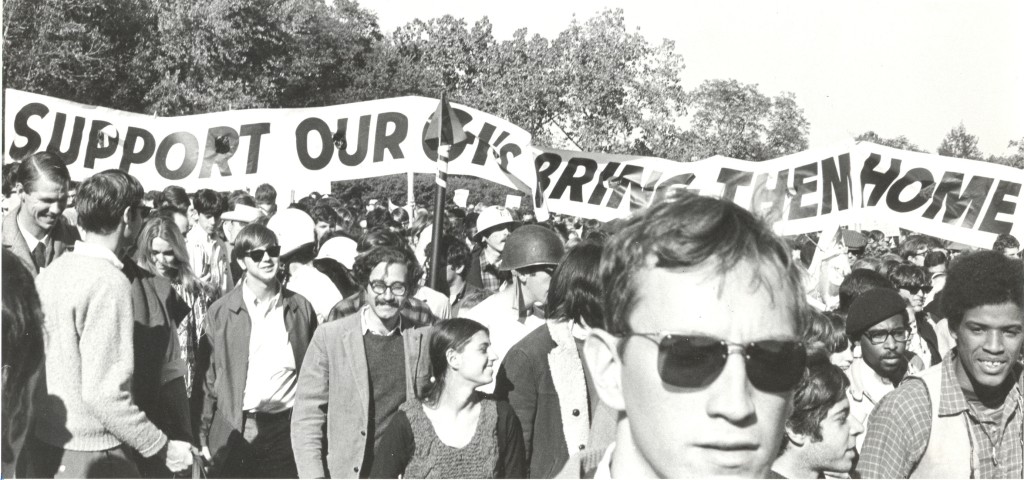
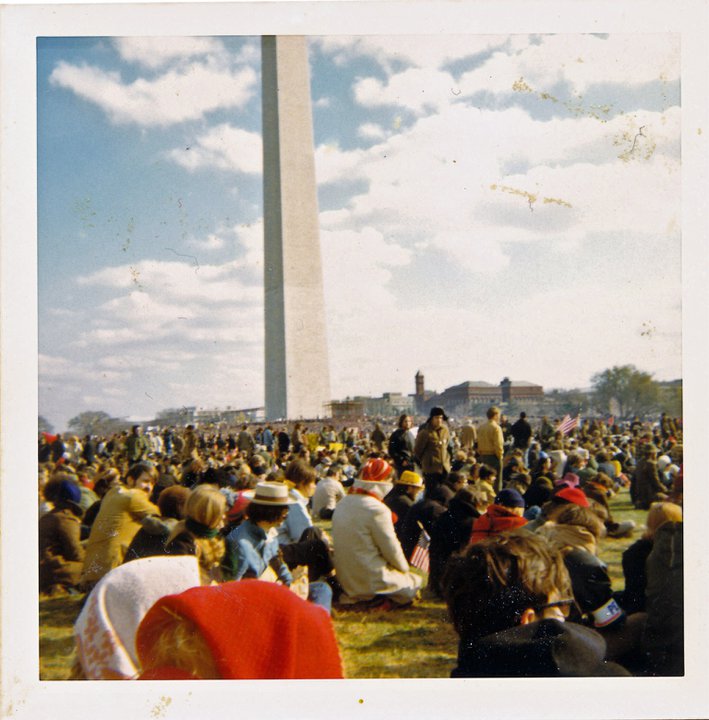
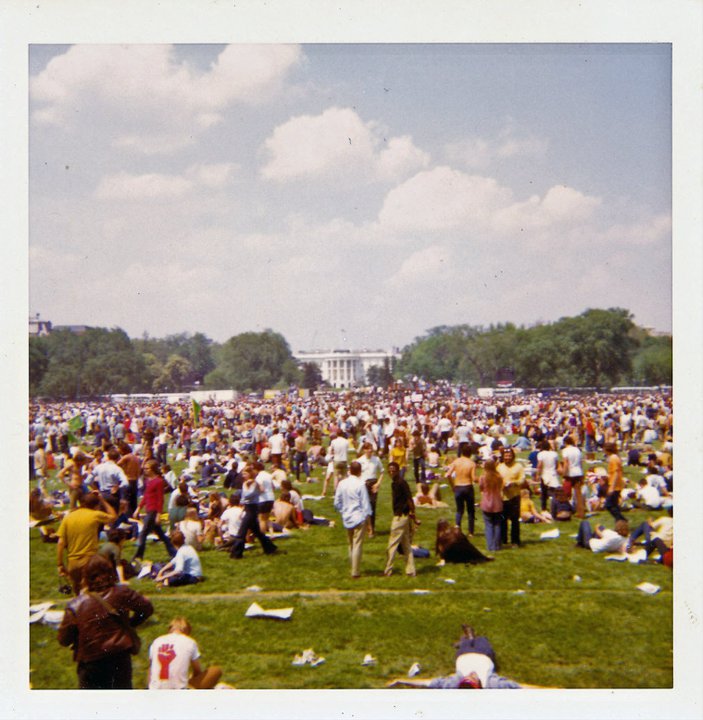
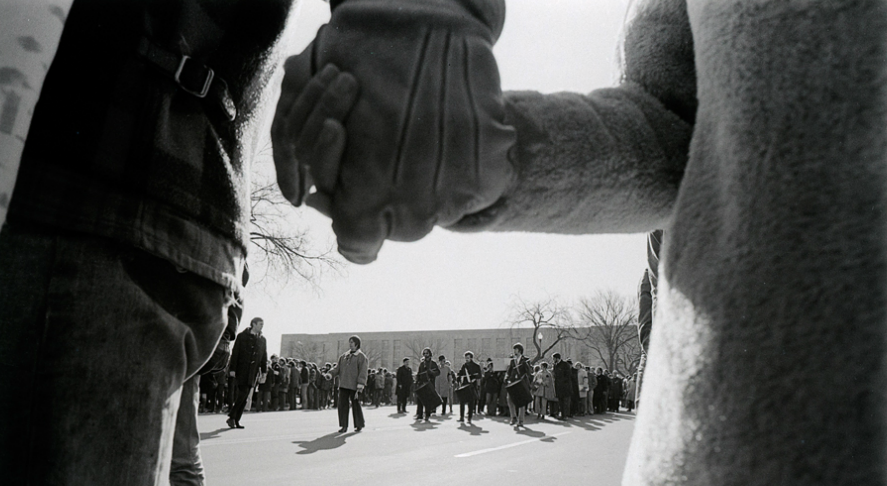
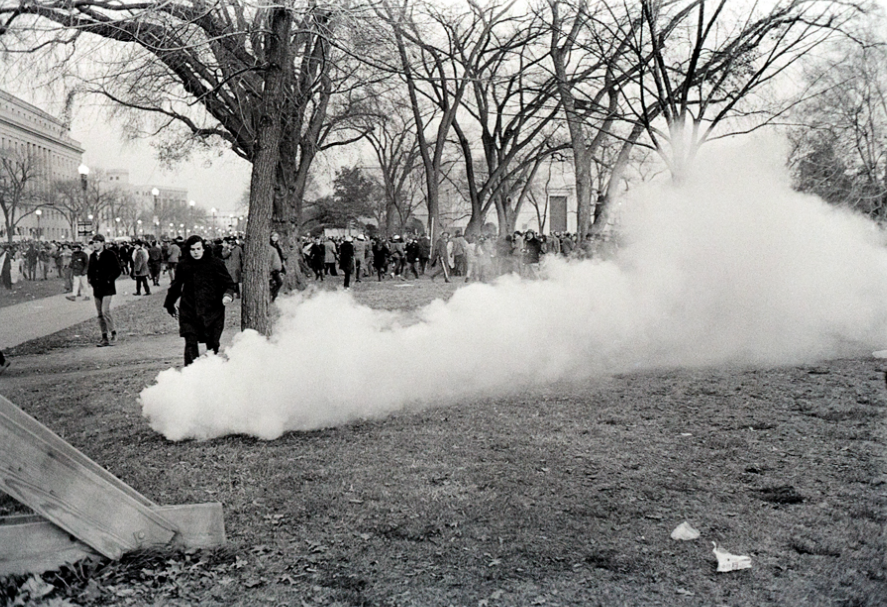
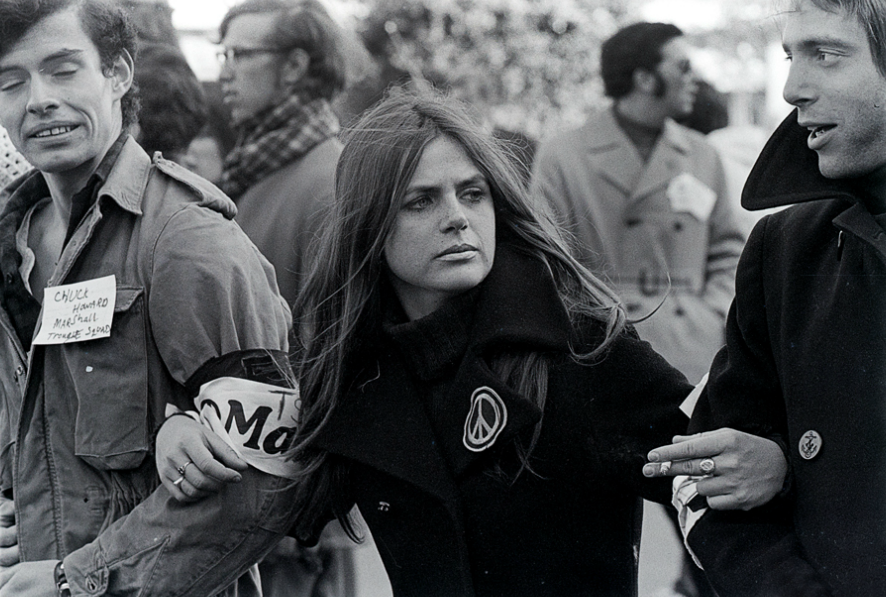
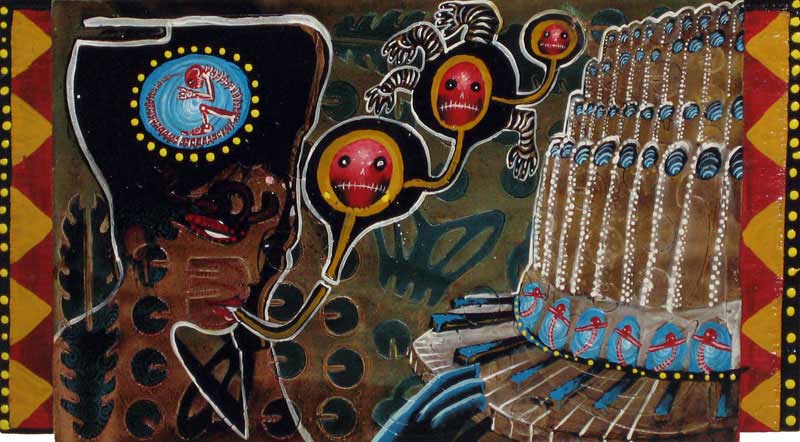

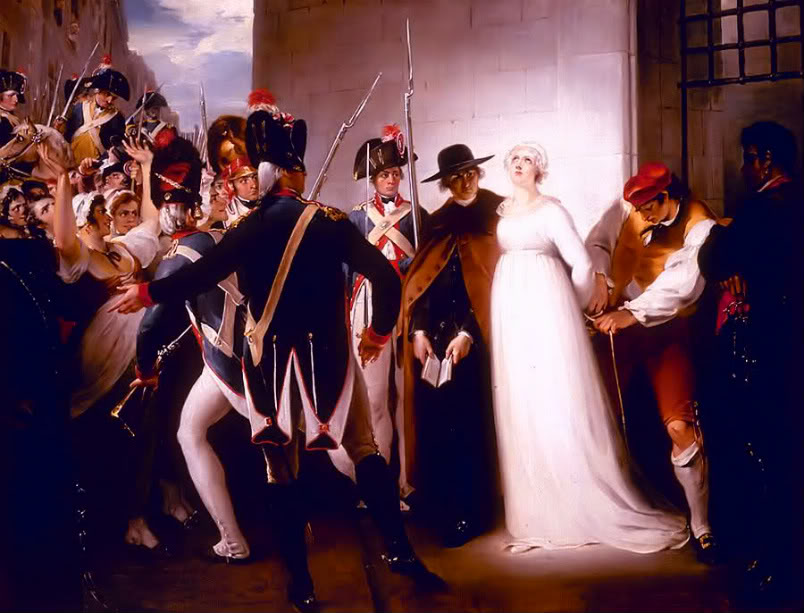





1 comment
Dr. Beth Fisher says:
Aug 8, 2013
Looking forward to reading the rest!